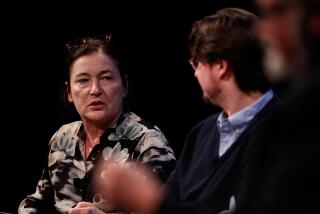Book Review : A Reconciliation of Life, Knowledge
- Share via
Alice’s Neck by Barbara Novak (Ticknor & Fields: $17.95; 271 pages)
The human eye cannot bear too much light, so we blink or turn away; without eyelids, we’d go blind. The human mind cannot bear too much unalloyed insight, Barbara Novak suggests in her bittersweet philosophical comedy, or it will go mad. It needs eyelids too.
Anna Bernstein, the innocent seeker in “Alice’s Neck,” is lidless. When we meet her, she is in a New York hospital recovering from a mental breakdown. She has been undone by a lethal combination: a gentle spirit, a voracious intellect, no intellectual defenses whatsoever and a carrel in Harvard’s Widener Library.
Long-necked and fair-haired, Anna arrived at Harvard as a kind of human tabula rasa and possessing an infinite openness. She is open to other people (within a month or two, she has taken three lovers, as much out of hospitality as passion), and to sensory experience (she goes into a near-orgasmic state devouring the knackwurst at a German restaurant in Harvard Square), and to the whole of human history and thought.
What could be better than to be able to fill one’s empty house with furniture of the very best quality? Novak, an art historian with a notable gift for writing, has made of Anna a graceful and delicate repository. And for mental furniture, of course, Widener Library is Sothebys.
Except that books do not lie still. They are records not only of human thoughts but also of the passions and contradictions that produced these thoughts. When you let ideas in, you let in lions; a lion-tamer is necessary. To tame ideas, you must be able to put them in order. Reversing Talleyrand’s dictum: To choose is to govern.
Anna can refuse an idea no more than she can refuse a man. On the man side, there is Andrew, an ebullient science historian who is her neighbor, adviser and generous-hearted pal. There is Victor, a starchy and exploitative art professor who is her mentor. She loves neither; she takes on both, out of sheer good will. The man she burns for, and who burns reciprocally, is Kurt, a painter and fellow art student.
Kurt aside, Anna’s love life is in most respects secondary, except that it allows Novak to limn the comedy in her inquiring intelligence and the poignancy in her openness. Her first meeting with Kurt in the course of a dispute about mustard at the sausage restaurant is one of a number of delightfully wacky scenes.
Incapable of Ignoring Things
If there is a touch of winsomeness in this, there is none at all in Anna’s mental journey. She goes deeper and deeper until she all but drowns. Not because she is incapable. On the contrary, her mind is exceedingly sharp. But she is incapable of ignoring things, and this puts her in danger.
Anna is an orphan, her parents having been killed in a car accident. She was raised by her Orthodox Jewish grandmother, most of whose family perished in Poland. Lacking history or forebears, Anna arrives at Harvard from Brooklyn College without even knowing much about the Holocaust. Strictly speaking, this is implausible; in fact, it is Novak’s device to start her fresh.
Anna seeks inspiring intellectual models. What she finds is perpetual contradiction and, beneath this, horrors. She tries to reconcile John Ruskin’s writing with his mistreatment of his wife, Effie. She tries to reconcile the New England intellectual tradition with the witch-hunting of Cotton Mather. She studies the penumbral mysticism of the German painter Caspar David Friedrich; she comes to Hitler, and the eradication of Poland’s Jews.
Books overflow her carrel. Each contradiction sets off a new research project and a new challenge to her stability. It is not the weight of the books that threatens her but the darkness in them. For a while, she consoles herself with Lewis Carroll’s Alice, a companion in her bewilderment. Like Alice’s, her own head has shot up higher and higher until she has lost sight of herself.
The most profound contradiction, the one that breaks her, arises from her love for Kurt. His family is German; his grandfather, whom she meets, is a former Nazi official. Kurt argues that history has no right to rule the present, and he presses her to marry him. She believes him. But she cannot believe him.
Novak has produced a touching and engaging novel of ideas. It founders in a few spots. Anna’s dilemmas acquire a certain sameness, and the spiritualist sessions which she attends in search of guidance do not accomplish much. Mostly, though, “Alice’s Neck” keeps very much alive.
It is a tragicomedy about the impossibility of reconciling human life and human knowledge; it is very serious without taking itself over-seriously. And if, at the end, Anna seems unlikely ever really to escape her mental torment--she will leave the hospital; will she be back?--the book’s epigraph allows us to regard this with a certain serenity. It is Pascal’s:
“Men are so necessarily mad, that not to be mad would amount to another form of madness.”
More to Read
Sign up for our Book Club newsletter
Get the latest news, events and more from the Los Angeles Times Book Club, and help us get L.A. reading and talking.
You may occasionally receive promotional content from the Los Angeles Times.










